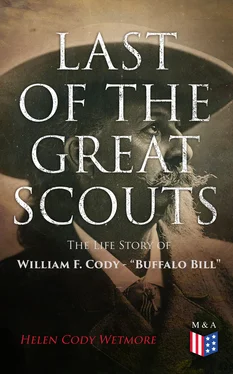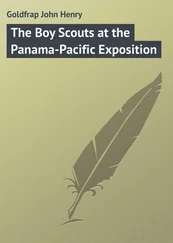One day when we were looking forward to one of these visits, our good friend Mr. Hathaway made his appearance about eleven o'clock.
"It is too bad to be the bearer of ill tidings," said he, "but the news of your husband's expected visit has been noised about in some way, and another plot to kill him is afoot. Some of his enemies are camped at Big Stranger's Creek, and intend to shoot him as he passes there."
Then followed a long and anxious consultation, which ended without any plan of rescue.
All of which had been overheard by Will, who was confined to his bed with an attack of ague. In him, he decided, lay the only hope for father's safety; so, dressing, he presented his fever-flushed face to mother. As he held out a handkerchief, "Tie it tight around my head, mother," said he; "then it won't ache so hard."
A remonstrance against his getting out of bed brought out the fact that he contemplated riding to Grasshopper Falls!
He was almost too weak to stand, a storm threatened, and thirty miles lay between him and father; yet he was not to be dissuaded from his undertaking. So Julia and Martha saddled Prince and helped the ague-racked courier to his saddle.
The plunge into the open air and the excitement of the start encouraged Will to believe that he could hold out. As he settled down to his long, hard ride he reflected that it was not yet noon, and that father would not set out until late in the day. Prince seemed to discern that something extraordinary was afoot, and swung along at a swift, steady gait.
Big Stranger's Creek cut the road half-way to the Falls, and Will approached it before the afternoon was half gone. The lowering sky darkened the highway, and he hoped to pass the ambush unrecognized; but as he came up to the stream he made out a camp and campers, one of whom called out carelessly to him as he passed:
"Are you all right on the goose?"—the cant phrase of the pro-slavery men.
"Never rode a goose in my life, gentlemen," was the reply.
"That's Cody's boy!" shouted another voice; and the word "Halt!" rang out just as Will had galloped safely past the camp.
Will's answer was to drive the spurs into Prince and dart ahead, followed by a rain of bullets. He was now well out of range, and the pony still strong and fleet.
The chase was on, and in the thrill of it Will forgot his weakness. A new strength came with the rush of air and the ring of hoofs, and "I'll reach the Falls in time!" was his heartening thought, as pursurer and pursued sped through the forests, clattered over bridges, and galloped up hill and down.
Then broke the long-impending storm, and the hard road became the bed of a muddy stream. The pursuit was abandoned, and this stimulus removed, Will felt the chills and weakness coming on again. He was drenched to the skin, and it was an effort to keep his saddle, but he set his teeth firmly in his resolve to accomplish his heroic purpose.
At last! A welcome light gleamed between the crystal bars of the rain. His mission was accomplished.
His ride had been longer by ten miles than that famous gallop of the friend of his after years—Phil Sheridan. Like Sheridan, he reached the goal in time, for father was just mounting his horse.
But the ride proved too much for his strength, and Will collapsed. Father started with him, a few days later, for Topeka, which was headquarters for the Free State party.
Father acquainted mother of their safety, and explained that he had gone to Topeka because he feared his life was no longer safe at Grasshopper Falls.
Party strife in Kansas was now at its height. Thousands came into the territory from adjacent slave states simply to vote, and the pro-slavery party elected a legislature, whose first meeting was held at Le Compton. This election the Free Soilers declared illegal, because of fraudulent voting, and assembling at Topeka in the winter of 1855–56, they framed a constitution excluding slavery, and organized a rival government. Of this first Free-Soil Legislature father was a member.
Thenceforth war was the order of the day, and in the fall of 1856 a military governor was appointed, with full authority to maintain law and order in Kansas.
Recognizing the good work effected by the emigrant-aid societies, and realizing that in a still larger Northern emigration to Kansas lay the only hope of its admission as a free state, father went to Ohio in the following spring, to labor for the salvation of the territory he had chosen for his home. Here his natural gift of oratory had free play, and as the result of his work on the stump he brought back to Kansas sixty families, the most of whom settled in the vicinity of Grasshopper Falls, now Valley Falls.
This meant busy times for us, for with that magnificent disregard for practical matters that characterizes many men of otherwise great gifts, father had invited each separate family to make headquarters at his home until other arrangements could be perfected. As a result, our house overflowed, while the land about us was dotted with tents; but these melted away, as one by one the families selected claims and put up cabins.
Among the other settlers was Judge Delahay, who, with his family, located at Leavenworth, and began the publishing of the first abolition newspaper in Kansas. The appointing of the military governor was the means of restoring comparative tranquillity; but hundreds of outrages were committed, and the judge and his newspaper came in for a share of suffering. The printing-office was broken into, and the type and press thrown into the Missouri River. Undaunted, the judge procured a new press, and the paper continued.
A semi-quiet now reigned in the territory; father resumed work at the sawmill, and we looked forward to a peaceful home and the joy of being once more permanently united. But it was not to be. The knife wound had injured father's lung. With care and nursing it might have healed, but constant suffering attended on the life that persecution had led him, and in the spring of '57 he again came home, and took to his bed for the last time.
All that could be was done, but nothing availed. After a very short illness he passed away—one of the first martyrs in the cause of freedom in Kansas.
The land of his adoption became his last, long resting-place. His remains now lie on Pilot Knob, which overlooks the beautiful city of Leavenworth. His death was regretted even by his enemies, who could not help but grant a tribute of respect to a man who had been upright, just, and generous to friend and foe.
CHAPTER V. — THE "BOY EXTRA."
Table of Contents
AT this sorrowful period mother was herself almost at death's door with consumption, but far from sinking under the blow, she faced the new conditions with a steadfast calm, realizing that should she, too, be taken, her children would be left without a protector, and at the mercy of the enemies whose malignity had brought their father to an untimely end. Her indomitable will opposed her bodily weakness. "I will not die," she told herself, "until the welfare of my children is assured." She was needed, for our persecution continued.
Hardly was the funeral over when a trumped-up claim for a thousand dollars, for lumber and supplies, was entered against our estate. Mother knew the claim was fictitious, as all the bills had been settled, but the business had been transacted through the agency of Uncle Elijah, and father had neglected to secure the receipts. In those bitter, troublous days it too often happened that brother turned against brother, and Elijah retained his fealty to his party at the expense of his dead brother's family.
This fresh affliction but added fuel to the flame of mother's energy. Our home was paid for, but father's business had been made so broken and irregular that our financial resources were of the slenderest, and should this unjust claim for a thousand dollars be allowed, we would be homeless.
Читать дальше












